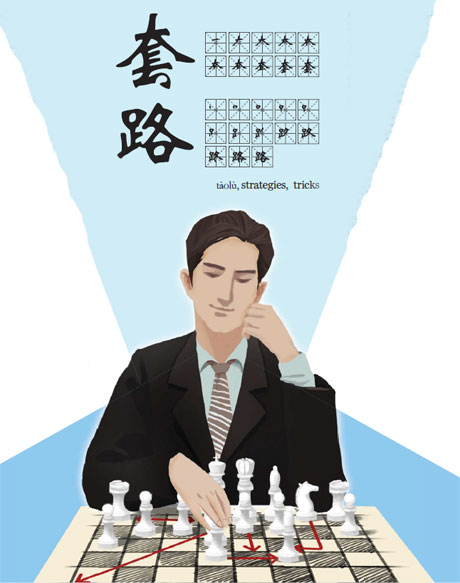Less strategy, more sincerity

Phrases to cutting through all the cliched methods and schemes
If your girlfriend says: "When I was taking my medicine this morning, I heard some news," do not, under any circumstances, answer with "What news?"
If you do, you will have fallen into a trap, and the next thing you're likely to hear is: "Why didn't you ask me why I was taking medicine? You don't care about me."
A slightly longer version of this relationship trap went viral online, and many victims of this scheme reached for a new, emerging phrase: Less strategy, more sincerity (少一点套路,多一点真诚; shǎo yīdiǎn tàolù, duō yīdiǎn zhēnchéng).
No one is sure about its exact origin, but it is now employed almost everywhere.
Apparently, the essence of the buzzword is 套路 (tàolù), which is really hard to translate into English. It refers to methods, tricks, strategies or schemes, especially cliched ones. For example, a man walks up to a woman in a bar and says, "Have we met before?" The response to this is, "Come on. Less strategy, more sincerity, okay?" It means he should stop with the routine nonsense and be more creative.
In practice, however, as Chinese people rarely demonstrate their thoughts in a straightforward manner, 套路 will always have its place. Chinese conversations can seem like a chess game sometimes; the one who pulls off the most tricks wins.
The most common tàolù you'll hear is probably: "Here's a thing I'm not supposed to tell you, but I feel like you should know." Apparently, the speaker is ready to gossip but will wait for you to ask what it is first - and if you do, you're the gossip. So be tough, and answer with: "Say it or save it. Less strategy, more sincerity, please." (爱说不说。少一点套路,多一点真诚; ài shuō bù shuō. Shǎo yīdiǎn tàolù, duō yīdiǎn zhēnchéng.)
Sometimes, you can just omit the sincerity part, because the word tàolù is useful enough.
A pop star's promotional stunt is tàolù. You may hear someone say: "The lead actor and actress of the movie began a relationship? Just exactly when will it come out?" (电影的男女主角被曝出恋情?在电影马上就要上映的时候? Diànyǐng de nánnǚ zhǔjué bèi bàochū liànqíng? Zài diànyǐng mǎshàng jiù yào shàngyìng de shíhòu?)
So, you respond: "A classic tàolù. I guess if they work together in another movie, their breakup will make even more headlines." (经典套路。我猜如果他们之后再合作一部电影,他们分手的消息还能再上一次头条。 Jīngdiǎn tàolù. Wǒ cāi rúguǒ tā men zhīhòu zài hézuò yībù diànyǐng, tāmen fēnshǒu de xiāoxī hái néng zài shàng yīcì tóutiáo.)
Actually, for many people, anything on the planet they don't understand can all be interpreted as tàolù.
When the game between AlphaGo and the South Korean Go master was in the news, regardless of all the artificial intelligence technology behind the game, someone commented: "The robot is of course better at tàolù than humans."
As for what tàolù actually is, who cares?
If you are tired of the endless tàolù, come back to our "less strategy, more sincerity" creed to help you get to the point.
Courtesy of The World of Chinese, www.theworldofchinese.com
The World of Chinese

(China Daily European Weekly 07/29/2016 page23)
Today's Top News
- Xi's article on CPC self-reform to be published
- Xi stresses improving long-term mechanisms for cyberspace governance
- Experts share ideas on advancing human rights
- Japan PM's remarks on Taiwan send severely wrong signal
- Key steps to boost RMB's intl standing highlighted
- Sustained fight against corruption urged






























